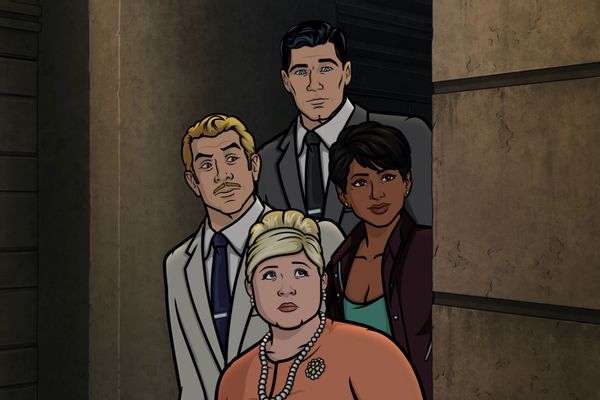Sterling Archer has handled missions in some of the furthest locales on the globe, as well as under the sea, in space, inside the human body, and within his subconscious. He's been shot so many times over 13 seasons of "Archer" that anyone keeping count must have dropped that task some time ago. He's a survivor in other respects too – of sexual assault, cancer, a murderous alcohol addiction and an overbearing mother, Malory, who both smothers him and skewers his self-worth.
All this shaped Sterling Archer (H. Jon Benjamin) into the world's greatest spy, a superlative he claims with more consistency than living up to it. Spending 14 years with him instills the audience with the impression that there's nothing he cannot royally mess up and eventually fix, albeit with ample help from fellow operative and on again, off (and we mean way, way off) again romantic partner Lana Kane (Aisha Tyler), with whom he shares a daughter.
Now that it's ending this season, "Archer" seriously examines a question those around him throw in his face more or less constantly: Is Sterling Archer really the world's greatest agent, or does he simply look the part? Which is to say, is the fact that he's a white guy in a suit with a, um, "classic" (as in, outdated) haircut and a Herculean sense of entitlement doing more work in his favor than the results of his unconventional and highly destructive methods?
This is the "Archer" version of gaming out the discourse accompanying transitional moments between one white British male actor stepping into the role of James Bond and the next white British guy. I'd go so far as to posit the show was obligated to circle back to this question since it primarily functions as a send-up of cinematic genres.
Is Sterling Archer really the world's greatest agent, or does he simply look the part?
Ian Fleming's unstoppable MI6 agent is the show's blueprint, recognizable in the way Archer is drawn and his supporting roles. The icy, glamorous Malory, voiced by the late and eternally fabulous Jessica Walter, was an agent in her previous life and a funhouse mirror reflection of Dame Judi Dench's M. Their agency, once known as ISIS – until, you know, that terrorist organization ruined that name for everyone – is a collection of personalities drawn from various 007 exploits and the screwball workplace side of "Get Smart."
 Archer (FX)
Archer (FX)
Dr. Algernop Krieger (Lucky Yates) is part Q, part mad scientist who may be a Hitler clone. In place of Miss Moneypenny is sociopathic heiress Cheryl Tunt (Judy Greer), supposedly a personal assistant, although the only career to which she contributed any effort was her brief stint as a country western singer named Cherlene.
Rounding out these kooks are intelligence analyst Ray Gillette (voiced by series creator Adam Reed); human resources director and occasional cage-fighting champion Pam Poovey (Amber Nash) and Cyril Figgis (Chris Parnell), the office accountant and whipping post.
All of these folks are self-serving and various degrees of terrible to each other and random bystanders. The fresh wrinkle is that Archer's new field partner Zara Kahn (Natalie Dew) is immune to his supposed charm.
Lana is management now, having assumed leadership of The Agency after the downfall of the corporate vulture who took it over during the 12th and 13th seasons. Zara is a relatively fresh talent and, like Lana, Archer's equal in skill and a more effective strategist. Unlike Lana, she's a Brown British woman unwilling to defer to a white guy's high opinion of himself.
We need your help to stay independent
Zara doesn't automatically kowtow to workplace hierarchies, either. At one point she reminds her new boss that everything in the Western world's power structure is a product of colonialism. As Lana strives to use The Agency to make the world a better place, Zara asks whether her methods support that hardwired patriarchal structure.
The scripts don't use all those terms, of course. The "P" word? Nah. Colonialism? Sure. This is still a series that used the cover of "Archer Vice," where they temporarily became drug lords and coke hounds, to take a hard gaze at the United States' continued foreign policy blunders in Latin America and its role in propping its monstrous regimes. For my money, the show was never that stupendous again.
But it's always been inclusive, albeit with varying degrees of success since its humor is also edgy and frequently blue. Ray, for example, may have been the only openly gay spy on TV for many years until "Killing Eve" came along. He also used a wheelchair for a time after losing the use of his legs, until Krieger fit him with bionic replacements of questionable functionality.
"Archer" has always been inclusive, albeit with varying degrees of success.
Tyler's Lana owns her Blackness in a largely white field, which we saw through the series' introducing her parents and, several times, placing her in situations where her identity stood out as much as her unusually large hands. Another upcoming adventure introduces a swashbuckling hero styled after "Temple of Doom"-era Indiana Jones, down to a sidekick called Half-Pint. However you may picture these characters from reading that description, you're probably way off – making it an offshoot of this season's central thesis.
 Archer (FX)In the main, though, "Archer" plots only developed facets of the story related to identity as far as they served the title character and Lana's combined and individual character development – but primarily that of its debonair playboy Archer. With his egomania commanding all the attention, the writers indulged in sociocultural critique both as an undercurrent and as the main show. Even Archer's bout with cancer did double duty by lending vulnerability to a man who would otherwise be intolerable, and showing how differently the world treats sick people who don't have power and privilege.
Archer (FX)In the main, though, "Archer" plots only developed facets of the story related to identity as far as they served the title character and Lana's combined and individual character development – but primarily that of its debonair playboy Archer. With his egomania commanding all the attention, the writers indulged in sociocultural critique both as an undercurrent and as the main show. Even Archer's bout with cancer did double duty by lending vulnerability to a man who would otherwise be intolerable, and showing how differently the world treats sick people who don't have power and privilege.
Want a daily wrap-up of all the news and commentary Salon has to offer? Subscribe to our morning newsletter, Crash Course.
Longtime viewers may know there's a good man under all that drunken, womanizing bluster since we've seen Archer evolve. Zara hasn't, so to her, he's just another white guy getting breaks he may not have fully earned.
A prevailing opinion holds that "Archer" ran out of things to say after Season 10, when its creator Adam Reed stopped writing episodes. There's some accuracy in that argument; it was never unwatchable, but its captivating charms certainly waned. The comedic roughhousing fell into a predictable rhythm, the character evolution slowed and its sociopolitical critiques grew soft.
Since only four episodes were made available to review there isn't enough evidence to declare the show entirely revived. But that may not be necessary for any veteran operative, whose main concern may be staying alive long enough to enjoy retirement. That would be a sign of growth for Archer, a man who never accepted the world wasn't his. Zara challenges that view with her superior skills and wit, showing herself more than capable of taking over the world-saving business.
This lesson may be brought to us by a cartoon, but that message exceeds two dimensions. Spy thriller casting producers, take note.
New episodes of "Archer" air 10 p.m. Wednesday on FXX and are available on Hulu the next day. The season premiere is currently streaming on Hulu.
Read more
about "Archer"



Shares